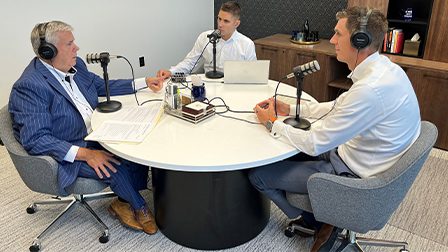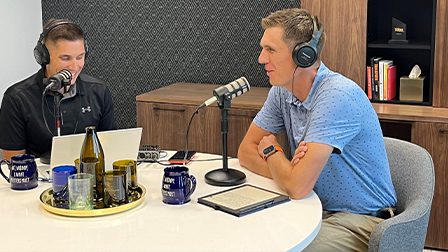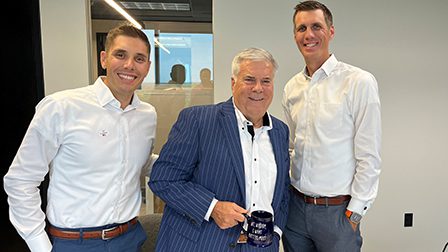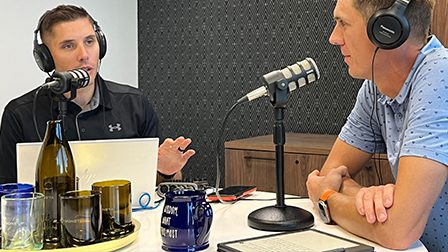Episode Transcript
In this episode, a woman who retired several years ago reveals the two words that were the sign it was time to retire, and her path for transitioning out of full-time employment. She also discusses the ways her career skills have led her shift into an active, adventurous retirement.
Episode 2
Kyle: Welcome to episode number two of Wit, Wisdom, and What Matters Most, a podcast with Moneta’s Gast, Freeman, Troyer, Racen Team. What matters most is different for everyone, and of course, you need to make wise decisions to be sure that you and your family are financially secure, but that’s only one aspect of your well-being. My name is Kyle Lutters, advisor on the team, and I’m joined by Danton Troyer, one of the partners here on the team.
And Danton, very excited for the guest in this edition because we get the chance to meet a lot of folks, and today’s guest is probably one of the most full-of-energy people I think I’ve had the pleasure of coming across – it’s Judy Lampe today.
Danton: Yeah, I’ve known Judy for, gosh, almost probably 15 years now, and it’s been interesting. I met her when she was actually working at Scottrade and doing some of their build-outs for their new buildings, or new offices, I should say, and so it was interesting to see her journey and help plan her and her husband’s retirement throughout the years. And now they’ve been retired for several years, so it’s been interesting, especially as she was really approaching that retirement deadline. Unique for her was her company was getting bought out, so Scottrade was getting purchased through TD Ameritrade, so it was interesting to see how that affected her, personally, and her retirement decisions as she was making those very important decisions.
Kyle: Yeah, very much so, and we’ll get into a number of different topics in this interview, but we talk about TD Ameritrade, we talk about what it was like and what kind of precipitated her retirement, what she’s doing, and also, too, what skills that she had that transferred from her working lifetime to her retirement.
So, with that all being said, here’s our conversation with Judy Lampe.
Kyle: And now we’re sitting down here on Wit, Wisdom, and What Matters Most with Judy Lampe. Judy, welcome, and thanks for being here today.
Judy: My pleasure.
Kyle: Awesome, awesome. So, Danton and you have known one another for a long time?
Judy: Yes.
Kyle: And so, I kind of wanted to extrapolate a little bit and start kind of at base one, but when did you know that it was time to retire?
Judy: Well, my boss told me two words, and with those two words, I knew it was time to retire. Many people said, you’ll get a sign, and for several years, I thought, boy, that’s interesting. I wonder if I’ll recognize the sign.
I had a very demanding job, and my boss, who I had trained and used to do the same job as I did, she was now my boss, and she asked me if I would fill in for someone for a week. They had a very time-consuming job, as did I, so I thought that would be almost impossible for me to do both jobs, but I had a solution.
So, I said, well, Susie Q just started working for us, and she was a temp, and she’s already done that job, and she doesn’t have any full responsibilities yet, because she’s new. Could we just have her fill in? And these are the two words she told me, absolutely not. And I just knew at that point, that’s the sign.
I mean, to me, that was a big sign. So, I was very calm. I was 68 at the time, so I didn’t really have to keep working, and I made an appointment to see the vice president, who I used to job-share with; she knew what I did. I said, “Well, I could do my job from 7 a.m. to 5 pm, and I could do the other job from 5 pm to 11 pm, but I said, I just really don’t want to do that, and as a matter of fact, I’d like to go part-time.”
And she said, “Well, I understand.” So, she asked the COO, and she said right away, “Well, Judy can’t go part-time; she’s too busy.” And they said we’d have to hire another person and that’s not in the budget.
So, I was very at ease with all of this, because I was at the stage where I didn’t really have to work. I thought, it’s winter, I’m not going to resign at this time, I’ll wait until spring. And I’d written my letter, I didn’t tell anyone, except my husband, what I was going to do. And right before I was getting ready to turn in the two weeks resignation, my boss brought me into the conference room and said, “We decided to let you go part-time.”
And I said, “Oh,” I said, “Well, that’s good.
“And you can start Monday.”
And I said, “Well, I’m going to have to check with HR to see about my insurance coverage.”
So, it worked out, I went part-time at 68. And I asked one of the other bosses, I said, you know, I’m kind of surprised everyone changed their mind. What made them do so? He said, “Well, we decided if you would have left, it wouldn’t have been good.”
So, my best advice is, you know, don’t get rid of the workhorse. And that’s the second time in my 40 years working that I asked to go part-time. And both times I was told no. And both times they came back and said, okay.
Danton: How did, or I guess, how long did you end up working part-time then for them and continue to do that work for them?
Judy: Well, there came a little wrinkle because our company, Scottrade, got bought out by TD Ameritrade. So then I was told, you can’t leave until we tell you we don’t need you anymore.
Now, I could have walked, but I’d have to give up a year’s severance pay. So, I worked till I was 70 and a half. And I’m glad it was part-time instead; I worked three days a week.
Danton: Do you regret extending your career through that part-time or do you think it was the right choice?
Judy: No, I don’t. And by going part-time in my job, I would do like 30 buildouts at a time throughout the United States. So I had a lot going on, but once we were going to be sold, we stopped doing buildouts. So, there were a lot of jobs I could do because I had worked there 18 years. So they could tap me on the shoulder and ask me to do different projects or whatever. And that was fine; I was happy with that.
Kyle: You mentioned buildouts. Help us understand a little bit about what you were doing. You’re talking about like building out different branch offices?
Judy: That is correct. We had 506 offices. And when we started early on, I would actually do a schematic on graph paper. I would call people, does your door open in, does it open out? Can you measure this for me? Because I wasn’t there.
I really didn’t have any expertise in this; it was on the job training. The president of the company just decided from what I was doing, he said, I think you can do this job.
I go, okay, I’ll try. And that’s the type of person he was. He was an excellent believer in people. And so that is what I did.
So, saying that I had 30 projects meant they were all throughout the United States at different stages. The year that we were told, the two of us, that we were going to build 100 offices, I thought, boy, that is just mind boggling. That is the year we hired an architectural group, which was fabulous. And then we also, once in a while, I’d go out and do site searches and then we’d hire a realtor. That was good, too.
So I wore a lot of hats, but that was fine. And with the help of the architects, who would then give me big construction documents, and they would do the schematics professionally, it was good.
But it was still fast-paced, though, because now we’re going to do 100 buildouts. And we probably brought on another person at that time, but it was a lot of responsibility. And I didn’t shy away from it, but I certainly embraced the help of the architectural firm and also, it was Sansone Group in the end, and they were very good.
Kyle: Okay, so you mentioned something earlier that I wanted to circle back to. You mentioned that this was the second time in your career that you asked to go part-time. Can you tell us a little bit about the first time that you asked, and how your career genesis went from the first part-time back to then full-time?
Judy: I first worked at Monsanto for five years, and this gentleman that I knew socially from St. Louis County government kept asking me to work for him in the Bureau of Finance, and that was Highways and Traffic. And I said, well, no, I really don’t want to do that.
“Oh, I’ll pay you more money.”
Well, you know, I was single, living in an apartment. He said, but you have to pass a test. You have to be one of the top three passing this test.
So, I thought, oh, all right, I’ll just take the test. I thought, I’ll never be one of the top three. There were probably four people there that day, I don’t remember.
But I passed the test, and I went to work for him. It really was a mistake, I feel, because Monsanto was a much better company to work for. But I worked for him five years.
Then I got pregnant, I was a stay-at-home mom, but he kept calling me up. Oh, could you work? So-and-so needs surgery, and can you come in for five weeks? And this, he asked me five different times to come back in, and that would be five days a week. Finally, I said, “You know, I’m really trying to be a stay-at-home mom, but I will work part-time until I have my next child, if that’s okay.” And he goes, oh, no, the director, he would never say that’s okay.
I said, “Well, you know, I’m sorry, but that’s my decision.” But he called the next day, and he said, “Now the director said you could.” So it just kind of happened organically.
But part-time is a good gig, if you can get it.
Danton: You stuck to your guns, and you got what you wanted in your career.
Kyle: So you would be someone that we would not want to play poker with.
Judy: Bridge, probably, bridge.
Danton: As you’ve now transitioned, and you’ve been, how long have you been retired for now?
Judy: I was 70 and a half, and I’ll be 77 in June, so that many years.
Danton: Well, just generally speaking, how has that transition been for you and your husband?
Judy: Right, I think it’s been good for both Bud and myself. The transition was going very smoothly until one major event occurred, COVID.
So I go from carefree living, doing whatever you want, to now I’m sequestered. And I thought, boy, this is not going to rock well with me. So what I decided to do was get three people that I trusted to come to my house and play bridge, because I was in several bridge clubs, but a lot of them wouldn’t come out. So that worked out fine. We played bridge at my house.
Then I also, I’m in a volunteer group, and there were like 50 people in my chapter. And I thought, you know, I’m going to start a walking group. We can go outside. That seems to be okay. We got up to 11 members, and we walked 18 months every week except Christmas and New Year’s, no matter what the temperature, because no one had anything to do.
I would pick the best day and the best time of day, and everybody wanted me to pick the location. So I had to make sure that the locations were okay, and I would walk them ahead of time to make sure that I could say, well, you park over here and you walk to the right, because we were walking like three to five miles, do you didn’t want to get lost; it wouldn’t be too good. And we walked 58 different places.
Danton: Oh, wow!
Judy: Some were hikes, but we would tell them ahead of time, this is a hike if you don’t want to do it.
Danton: Yeah, it sounds like you had a part-time job going even in retirement.
Judy: You know, I just can’t stop working, yeah. But also, I kind of took over the book club.
Kyle: Wait a minute, Judy, you said you retired, right?
Judy: I know, yeah, I know. You know, there is a work mode, and I know you fellows are in the work mode, and it’s hard to get out of the work mode.
Even my brother, who lives in the Villages, plays golf, and I was just visiting him, and he said to me, “Judy, aren’t you paying attention?” And I said, “No, I’m retired. What did you say?” But he’s still in the work mode part of the time, especially playing golf.
Kyle: I can see that. And what’s interesting, I think, too, is that when you talk about your career and your jobs at TD Ameritrade and Scottrade, and then what you’re doing in retirement, it seems like there’s this gift of organization that you have has translated from work mode to retirement mode. Do you feel that that was kind of seamless in a way; that you just kind of naturally gravitated towards finding those types of things and using your skill set in retirement?
Judy: Yes, absolutely. I think those are the perfect words. You use those skill sets if you have them. You don’t shy away from looking at something or being in a situation and thinking, oh, this is a trainwreck, maybe I could help. So I’m fine with that. I’d rather do something more organized than watch everything be haphazard when it doesn’t have to be.
Danton: Have you had any challenges or things that you have found that have been beneficial for you and Bud as far as that transition? Because he retired before you.
Judy: He retired before me, 11 years before me. He worked 30 year; I worked 40 years. Going part-time was a nice transition. And so we’re kind of like the tortoise and the hare.
And that’s good. There really wasn’t a big transition because when I was still working , I’d come home and make dinner and do whatever. And one day I thought, well, this is silly. You should make dinner. You should do the wash. But I said, “If you don’t want to, I’ll just quit my job.”
“Oh no, no, I’m happy to do those tasks.”
So that made my life easier. And as far as transitioning, I get up about two hours before Bud, which is good. I drink my coffee, read the paper, you know, look at the news a little, read my email. And then when he gets up, I’m ready to do something else.
Kyle: So that’s interesting because, one of the topics or the questions that we like to ask folks in retirement is, what does your day look like? And you’ve started to kind of describe that even in retirement, you still have a routine.
Judy: Yes.
Kyle: And do you think that that’s kind of key to getting the enjoyment out of retirement?
Judy: Yes, I do like the routine of getting up and easing into the day. But I started playing bridge with people I didn’t know at community centers. So, I’d have to get up earlier and wouldn’t have time to read the paper. But I feel that since there’s eight billion people in this world, I’d like to meet more of them. I don’t have to play with the same people I played with for 30 years.
And the people don’t care what you did for a living, they just care if you can play or not. But they’re interesting. The one guy was a CIA agent, but you would never guess it. Of course, I guess that’s a good thing. Well, that’s about all I could say. He said he flew a plane, but he didn’t have any dog tags or identification. And I thought, you know, this is fascinating, you know; I thought that was very cool.
Also, I use my organization skills, especially since it was during COVID, to downsize my house. I would put items on Facebook Marketplace, and while my friends are having things carted away for $2,000, I am making $2,000. So that was very good and I did it gradually. It was a game. I’d turn to Bud, well, what can I sell today? I sold my chandelier, I sold my dining room set, my treadmill, my exercise bike, anything that you could carry out of my house that I couldn’t lift. That was a benefit.
I’m still selling things; just give it a look-see.
Danton: Well, it sounds like you have a lot of activities in your retirement. Other than walking, is there anything that you found has been beneficial as far as just staying active and keeping health at the top of mind?
Judy: Health is very important. So, in addition to walking, for over 10 years I’ve taken a stretch and flexibility course once a week that seems like, well, how hard could that be? And I thought, it’s not hard. It’s about 10 minutes up and 40 minutes down on a mat. But it really helps with gardening, getting up, bending, stretching. I’ve taken some yoga classes, also. So, I do feel that’s a wonderful benefit and it makes you feel better.
Danton: I was curious because I know you’re active and a lot of people, especially with work, it keeps them active. But when you’re retired, it can be difficult to continue that.
Judy: But I do have one thing to say: don’t play pickleball! Because if you’re 70, because your body says go, but your mind says go, but your body says no. So you know, you pivot over to the right and left and all of a sudden your knee is still there or your ankle.
Danton: I’m 40 and that happens to me. I tried to play sand volleyball with my daughters’ 14-year-old team. We won, I will point that out, but I’m not sure how much longer that will last.
Judy: Right!
Danton: So for you chiropractors listening to this…
Kyle: Exactly! In getting to know you over the past year and a half or so, you like to travel. What have been some of the most memorable places that you’ve been since you’ve retired and had the opportunity to explore a bit more?
Judy: Well, because of COVID, I didn’t get that opportunity until recently. So last year I did take a trip to Canada, landed in Calgary, went to Banff in Lake Louise, which is fabulous! Then got on a train for two days and went through the Canadian Rockies and ended up in Vancouver. And these, even my brother and the Villagers, now, Judy, those are really nice places.
Yeah, I kind of figured that. And got to see the Northern Lights, which, you know, I never thought I’d see. But anywhere I have not been, would be exciting for me to travel to.
Kyle: You have any trips planned right now?
Judy: Yes, I do. I have six, which would be five little trips and a big trip is going on my birthday, June 26th, going to leave, fly to New York, for two days. This is a plane, a train, a bus and a boat.
Kyle: Oh, wow, you’re just missing the automobile.
Judy: Yeah, it sounds like a movie, doesn’t it? So, two days in New York, then you get on the train, go through the Adirondacks, and then you go to Quebec, Montreal. Then you get on the ship and you do Nova Scotia into Canada. I’ve done a lot of this trip before, but I’m going with some friends and I thought, well, you know, I’ll just kind of revisit it. Bud’s not up for traveling like that, but he’s seen a lot of it also, so that’ll be kind of fun for him to know where I am. He’s been there.
Danton: Sure, yeah. As you’ve been retired for several years, have there been any big surprises that have really jumped out at you from the time you’ve been retired?
Judy: Not really, because I always have low expectations and, therefore, then you’re not disappointed.
I felt that it would probably be more relaxing. The first thing I did was I gave all my watches away; so I don’t wear a watch anymore and, yes, I was a big watch person. Oh, I’m going to do this, got to do that. But a friend of mine years ago told me when she retired and stayed home with her kids, she threw her watches away. And I thought, wow, I don’t think I could ever do that, but I did.
And I’m not really a phone-aholic either. I don’t walk around with my phone, but it’s worked out fine. If I do need to be somewhere, I’ll write notes. I can set the alarm on my phone. But also watches, when you get older, you realize they don’t have any numbers on them; you can’t read them anymore. They’re fashion watches. So, I did buy a watch for the walkers, because there are some trails that aren’t loops and I’d be talking and talking. I thought, I’m going to get a little Timex $10 watch with numbers on it because ladies, we’ve just walked an hour. You have to go back. So that is the only time I would wear a watch.
Danton: Makes sense.
Kyle: Yeah. You know, as we kind of head for home here and wrap up our time together, I think in this series that we’re doing about retirement that Danton alluded to at the beginning, we’re getting perspective. And so what I’d like to ask you is, at the end of the day, what advice would you give the younger version of Judy in the lead up and the build up to retirement? What do you wish you could go back and tell yourself to be either prepared for or to do differently, anything like that?
Judy: The best advice is live below your means. Because you’ll be a lot happier. And I even tell my children, I’ve lived both ways, you know, even as a young single person, live below your means. We paid off our house years ago. I felt very good about that. Danton has been a wonderful advisor for us. And I didn’t even know if it would be possible to retire. But Danton said, no, I think you’ll be okay. And I really don’t see any big changes in my lifestyle.
Another hint I would say, be a volunteer. I’ve always volunteered. I’ve been the president of three different organizations for their chapters. One time, I was asked to run for the Parkway School Board, but I didn’t want to embrace that volunteer job.
Danton: You don’t seem like the political type.
Judy: Yes. But volunteerism is important, exercise is important, saving your money is important. Have a hobby. For me, it’s walking, gardening, bridge. But I also have always been wanting to write a book. At 19, my first book was Contemplations for a Tuesday Night. And I’d always think of the titles first. But I never finished these books. So my latest book is People Along the Way. And what I like to do is if I met a person I found special, they would get their own chapter, and that’s what the book would be. Then I decided, well, that’s kind of hard to write a book, I get about seven or eight chapters in. I think I’ll write a song first.
So I wrote a song and my brother, one of my brothers, and my two sisters-in-law and myself recorded it. My other brother was recording it on the phone and I wrote the words and the melody. And my one brother, who’s a musician, and he goes, well, can you read music? And I said, no, but I can sing into my phone. That’s the melody. And so that was kind of fun. But I hope to someday finish that book. I think it would be kind of cool.
Danton: It would be. Yeah, it’s great to hear all, I don’t know, the risk you kind of took throughout your life.
In doing the things that maybe are less conventional and most people maybe think they want to write a book, but no one does it. So it’s great to hear that you actually took the time and do the things, and continue to do the things, that you want to do. I think a lot of people back down and get scared to do those things, so I’m glad to hear you’re doing them.
Judy: Be a risk taker. I think that is good advice.
Kyle: And I think that’s an excellent way to end our time together. Judy, thank you so much. We appreciate you stopping by and giving us a piece of your time. I know it’s pretty busy.
Judy: It was my pleasure. Thank you very much.
Kyle: Thank you.
And again, Judy Lampe today on Wit, Wisdom, and What Matters Most. And Danton, I thought this was a fascinating conversation. You know, going part-time twice, that was interesting. And then also seeing too, how forces beyond your control can precipitate and facilitate the retirement story.
Danton: And it’s always interesting for me to hear the more full story as we do these interviews because I hear bits and pieces through helping think about retirement, what that looks like, but to hear what’s kind of going on in the background is always interesting as well.
Kyle: Right. And then, the way that she described – I still think it’s just amazing – it was those two words. And then she made the phone call to you to say, hey, you know, you’ve said that I can retire, but can I like really retire? Because it’s just something that triggered it, and that’s what I thought was very interesting about her story. And then too, the genesis, the transition of using the skills that made her successful in a 40-year working career – she didn’t shut them off in retirement; they naturally gravitated over really.
Danton: And it was interesting to hear all the things that she’s doing in retirement and while it maybe doesn’t make you feel as busy, it absolutely sounds like she’s very busy, even in retirement.
Kyle: And then the one thing that was touched on was when she retired, the world shut down.
Danton: You don’t think about how COVID affected all these different nuances of our lives and not just our economy, but also people as an individual. And so it’s interesting; it’s been several years now, but it still is having a lasting effect on people.
Kyle: There’s no doubt about that. And if you had to summarize a little bit, maybe two to three points, like what Judy’s story really can teach us about retirement, what would you say in that regard?
Danton: Yeah. I think she had some good words as far as summarizing things, as far as just living below your means. And we see that all the time as professionals, but what that means kind of at the individual level is different as well. And so really trying to have that mantra, and as she said, from the start, because it’s very hard once you get out in front of it to pull it back. So from the start, when you’re young, to try and live below your means, which is always easier said than done, it is a challenge. So I think that was a big takeaway.
And then maybe a surprise for me, it was all the, I called it, risk that Judy took. I don’t know that she saw it as risk necessarily, but I thought it was very interesting. Working over the years, you don’t always hear every story, or at least how they’re connected, and so that was very interesting for me to hear that side of things.
Kyle: Really enjoying these conversations around retirement and, now that we’re getting some more of these in, I’m really just enjoying the storytelling and appreciative to Judy, appreciative to you, and appreciative to folks that are taking the time to go on this journey with us. So again, thank you very much.
Wit, Wisdom, and What Matters Most is a production of Moneta’s Gast Freeman Troyer Racen Team, headquartered in St. Louis, Missouri. Until next time, he’s Danton Troyer and I’m Kyle Luetters.
© 2024 Advisory services offered by Moneta Group Investment Advisors, LLC, 100 South Brentwood Blvd., St. Louis, MO 63105 (“MGIA”), an investment adviser registered with the Securities and Exchange Commission (“SEC”). MGIA is a wholly owned subsidiary of Moneta Group, LLC. Registration as an investment adviser does not imply a certain level of skill or training. This is an advertisement. The information contained herein is for informational purposes only, is not intended to be comprehensive or exclusive, and is based on materials deemed reliable, but the accuracy of which has not been verified. Examples contained herein are for illustrative purposes only based on generic assumptions. Given the dynamic nature of the subject matter and the environment in which this communication was written, the information contained herein is subject to change. This is not an offer to sell or buy securities, nor does it represent any specific recommendation. You should consult with an appropriately credentialed professional before making any financial, investment, tax, or legal decision. Past performance is not indicative of future returns. You cannot invest directly in an index. All investments are subject to a risk of loss. Diversification and strategic asset allocation do not assure profit or protect against loss in declining markets. These materials do not take into consideration your personal circumstances, financial or otherwise. Trademarks and copyrights of materials linked herein are the property of their respective owners.




© 2024 Advisory services offered by Moneta Group Investment Advisors, LLC, 100 South Brentwood Blvd., St. Louis, MO 63105 (“MGIA”), an investment adviser registered with the Securities and Exchange Commission (“SEC”). MGIA is a wholly owned subsidiary of Moneta Group, LLC. Registration as an investment adviser does not imply a certain level of skill or training. This is an advertisement. The information contained herein is for informational purposes only, is not intended to be comprehensive or exclusive, and is based on materials deemed reliable, but the accuracy of which has not been verified. Examples contained herein are for illustrative purposes only based on generic assumptions. Given the dynamic nature of the subject matter and the environment in which this communication was written, the information contained herein is subject to change. This is not an offer to sell or buy securities, nor does it represent any specific recommendation. You should consult with an appropriately credentialed professional before making any financial, investment, tax, or legal decision. Past performance is not indicative of future returns. You cannot invest directly in an index. All investments are subject to a risk of loss. Diversification and strategic asset allocation do not assure profit or protect against loss in declining markets. These materials do not take into consideration your personal circumstances, financial or otherwise. Trademarks and copyrights of materials linked herein are the property of their respective owners.



